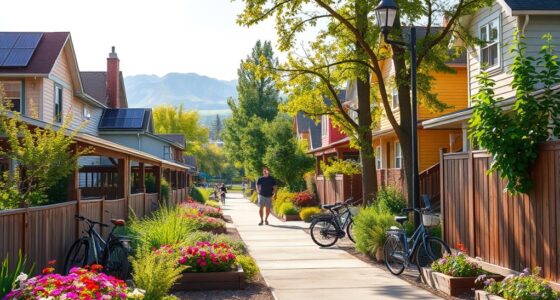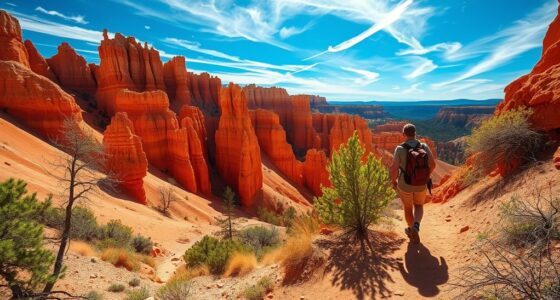To enjoy responsible stargazing in Nevada’s Basin and Range, practice good outdoor lighting habits by using shielded, low-impact lights and minimizing unnecessary illumination. Respect local ecosystems and communities by staying on designated trails, avoiding wildlife disturbance, and packing out all waste. Choose dark sky-friendly locations away from urban areas, and support conservation efforts that protect these natural nightscapes. Keep exploring to discover more ways to protect Nevada’s breathtaking night skies.
Key Takeaways
- Use fully shielded outdoor lighting and low lumen bulbs to minimize light pollution during stargazing.
- Choose designated dark sky parks or remote areas away from urban centers for clearer views.
- Respect local regulations and restrictions in protected areas to preserve natural night environments.
- Pack out all waste and avoid disturbing wildlife or damaging habitats while enjoying the night sky.
- Support policies and community efforts that promote responsible outdoor lighting and dark sky conservation.
Understanding the Importance of Dark Skies in Nevada

Nevada’s clear, dark skies are one of its most valuable natural assets, offering a rare opportunity for both residents and visitors to experience the universe in its true brilliance. Preserving these dark skies is essential for skyglow mitigation, which reduces light pollution and helps sustain the natural night environment. When excessive artificial lighting spills into the night, it not only hampers stargazing but also disrupts nocturnal wildlife that depends on darkness for survival. By understanding the importance of dark skies, you can appreciate how responsible lighting practices protect the environment and enhance your stargazing experience. Maintaining natural darkness supports healthy ecosystems and ensures that Nevada’s celestial beauty remains accessible for future generations. Your actions can make a difference in conserving this invaluable natural resource, especially through light pollution reduction efforts.
Practical Tips for Minimizing Light Pollution

You can reduce light pollution by using proper lighting that directs light downward and minimizes glare. Supporting local dark sky policies also helps preserve the night environment for everyone. Together, these small actions make a big difference in maintaining Nevada’s clear, star-filled skies. Additionally, choosing lighting with appropriate banking hours can ensure lights are turned off or dimmed during late-night hours, further reducing unnecessary light emission.
Use Proper Lighting
To minimize light pollution while stargazing, it’s essential to use proper lighting techniques. Choose lighting fixtures designed for dark skies, such as fully shielded fixtures that direct light downward. Opt for bulb types with low lumen output, like warm-colored LED bulbs, which reduce glare and skyglow. Adjust your lighting to minimize brightness and avoid unnecessary illumination. Here’s a quick comparison:
| Fixture Type | Bulb Type | Best Use |
|---|---|---|
| Fully shielded | Warm LED | Outdoor pathways, campsites |
| Semi-shielded | Soft white incandescent | General lighting |
| Directional lights | Amber or red bulbs | Focused task lighting |
Using the right fixtures and bulb types helps keep your surroundings dark, ensuring an ideal stargazing experience. Additionally, being mindful of light pollution and its impact on night skies encourages responsible outdoor lighting practices.
Support Dark Sky Policies
Supporting local and national dark sky policies is one of the most effective ways to reduce light pollution and promote sky preservation. By advocating for legislation that limits unnecessary outdoor lighting, you help protect the natural visibility of stars. You can also support initiatives that promote responsible lighting practices and enforce outdoor lighting standards. Consider engaging with community groups or policymakers to encourage the adoption of dark sky ordinances. These policies can reduce skyglow caused by excessive light pollution, making stargazing more enjoyable for everyone. Properly calibrated and high-quality projectors can also contribute to less light pollution indoors, indirectly supporting darker skies outside.
- Promote the use of fully shielded outdoor lights
- Advocate for curfews on non-essential lighting
- Support funding for dark sky preservation programs
- Attend public meetings to voice support for sky-friendly policies
- Educate others about the importance of sky preservation and responsible lighting
Staying Respectful of Local Ecosystems and Communities

When exploring Nevada’s Basin and Range, it’s vital to respect the delicate ecosystems and local communities that call this region home. You can do this by practicing local cultural sensitivity, which means honoring the traditions and values of nearby communities. Engage with local residents and organizations to learn about the area’s history and current needs. Avoid disturbing wildlife or damaging natural habitats, and stay on designated trails to prevent erosion. Remember, responsible stargazing isn’t just about lowering light pollution—it’s about maintaining the environment and respecting those who live here. Developing emotional intelligence can help you better understand and connect with the community’s perspectives and concerns. By showing respect and fostering community engagement, you help preserve Nevada’s unique landscapes and strengthen relationships with local people, ensuring everyone benefits from the region’s natural wonders.
Choosing the Right Locations for Responsible Stargazing

Selecting the right locations for responsible stargazing guarantees you can enjoy the night sky without harming the environment or disturbing local communities. To do this, seek areas away from urban centers where light pollution is minimal, ensuring clearer views for night photography and visual enjoyment. Look for designated dark sky parks or public lands that prioritize astro-tourism. Avoid sites near residential areas to prevent light spill and noise disturbances. Consider access and safety—choose spots that are easy to reach and well-maintained. Additionally, research local regulations to respect protected areas. By choosing your location carefully, you preserve the natural darkness essential for authentic stargazing experiences while minimizing impact on wildlife and communities. Incorporating wall organization systems into your planning can help you keep your gear organized and accessible during your excursions.
Leave No Trace: Packing Out and Waste Management

When stargazing, make sure to pack out all your waste to keep the night sky pristine. Use designated facilities whenever possible and avoid leaving food scraps behind. Practicing these habits helps protect Nevada’s natural beauty for future stargazers. Be aware of the importance of privacy and cookie policies that ensure your online experience remains transparent and secure.
Pack Out All Waste
To protect Nevada’s pristine landscapes, it’s essential that you pack out all your waste after your trip. Proper waste disposal keeps the environment clean and preserves the night sky’s beauty. Use eco friendly packing methods, such as biodegradable bags and reusable containers, to minimize your impact. Be sure to carry out all trash, including food scraps, packaging, and hygiene products. Consider these tips:
- Carry a designated trash bag for waste
- Compress waste to save space
- Separate recyclables from trash
- Avoid leaving any litter behind
- Dispose of waste in appropriate facilities once available
- Remember that personal growth includes responsible environmental stewardship, which helps ensure the preservation of natural beauty for future stargazers.
Use Designated Facilities
Using designated facilities for waste disposal is essential to guarantee you leave no trace of your visit. Always use nearby restrooms or trash receptacles instead of littering. This helps protect the pristine night skies and local environment. When indoors or in designated areas, rely on indoor lighting to minimize light pollution and reduce the impact on your surroundings. Carry a flashlight and practice flashlight safety to see clearly without disturbing others or wildlife. Avoid burning trash or leaving waste behind, as it can attract animals and create hazards. Pack out all waste, including food scraps and packaging, ensuring the area remains clean and welcoming for future stargazers. Proper waste management also supports the preservation of plants and local ecosystems, which are vital for maintaining Nevada’s natural beauty. Following these practices preserves Nevada’s dark skies and keeps your stargazing experience responsible and enjoyable.
Minimize Food Scraps
Carrying out waste responsibly extends beyond trash and includes minimizing leftover food scraps. Food waste attracts animals and creates litter, so be mindful of what you discard. To reduce food scraps, plan your meals carefully, bringing only what you need. Use composting methods suitable for your location, like portable compost bins or biodegradable waste bags. Properly storing leftovers prevents spoilage and waste. When possible, share extra food with others or donate unopened items. Remember to:
- Pack out all food scraps, no matter how small
- Use composting methods that suit your environment
- Avoid leaving leftover food in the open
- Reduce packaging waste by choosing minimal or biodegradable options
- Be conscious of food waste to keep the night sky clear of litter and keep wildlife safe
Additionally, utilizing pimple patches can be a discreet way to treat skin blemishes without creating additional waste or packaging.
Supporting Conservation Efforts and Dark Sky Initiatives

Supporting conservation efforts and dark sky initiatives in Nevada’s Basin and Range is essential for preserving the region’s stunning nightscapes. By respecting astrophotography ethics, you help maintain the natural darkness that attracts stargazers and researchers alike. Advocacy for light pollution legislation can reduce unnecessary lighting, safeguarding wildlife and human health. You can participate in local initiatives, such as community dark sky festivals or conservation programs. Consider the table below to understand key efforts:
| Initiative Type | Goal | Your Role |
|---|---|---|
| Light Pollution Legislation | Enforce responsible outdoor lighting | Support policies and advocate for change |
| Dark Sky Reserves | Protect night sky areas | Respect restrictions and promote awareness |
| Educational Campaigns | Raise awareness about night sky value | Share knowledge and participate actively |
| Community Events | Foster local engagement | Attend, volunteer, and spread the message |
Frequently Asked Questions
How Can Amateur Astronomers Contribute to Dark Sky Conservation Efforts?
You can contribute to dark sky conservation by engaging in community outreach, educating others about the importance of preserving nightscapes. Practice sustainable habits like using red lights and minimizing light pollution. Share your passion for stargazing, inspiring others to protect our night environment. By promoting awareness and adopting responsible habits, you help guarantee dark skies for future generations, fostering a community committed to sustainable practices and the continued wonder of the cosmos.
What Are Common Misconceptions About Light Pollution and Its Effects?
Light pollution often hides behind the curtain of urban glow, making you think sky brightness is just a minor inconvenience. But in reality, it drowns out stars like a relentless flood, obscuring our view of the cosmos. Many believe it only affects astronomers, yet it disrupts ecosystems and wastes energy. Recognizing these misconceptions helps you see that reducing light pollution preserves our night sky’s natural beauty for everyone.
Are There Specific Regulations or Permits Required for Stargazing in Nevada?
When you plan to stargaze in Nevada, you should check if you need any stargazing permits or follow specific Nevada regulations. Generally, public areas don’t require permits, but some private lands or protected parks might. Always research local rules beforehand to avoid issues. Staying informed about Nevada regulations helps you enjoy clear skies responsibly and safely, ensuring you don’t accidentally break any laws during your stargazing adventures.
How Does Light Pollution Impact Local Wildlife Besides Nocturnal Animals?
Light pollution affects more than nocturnal animals; it disrupts the entire ecosystem by interfering with plant growth, insect behavior, and animal communication. When urban development increases, artificial lights can cause ecosystem disruption, making it harder for species to find food, reproduce, or migrate. You might not see the immediate impact, but these changes can threaten biodiversity and weaken the natural balance in your local environment.
What Are the Best Ways to Educate Others About Responsible Stargazing?
When you want to educate others about responsible stargazing, focus on community outreach and educational programs. Share the importance of reducing light pollution and its effects on wildlife and star visibility. Organize local events, workshops, or star parties to engage people directly. Use social media to spread awareness and collaborate with schools or community centers. Your active involvement helps foster a culture of responsible stargazing and environmental stewardship.
Conclusion
By practicing responsible stargazing, you become a guardian of Nevada’s dark skies, preserving their magic like a delicate starry tapestry. Every mindful action, from turning off lights to respecting ecosystems, helps keep this celestial canvas vibrant for generations to come. Remember, you hold the brush that paints the night sky—choose to use it wisely. Together, we can make sure Nevada’s Basin and Range remains a breathtaking, unspoiled masterpiece of darkness and light.









